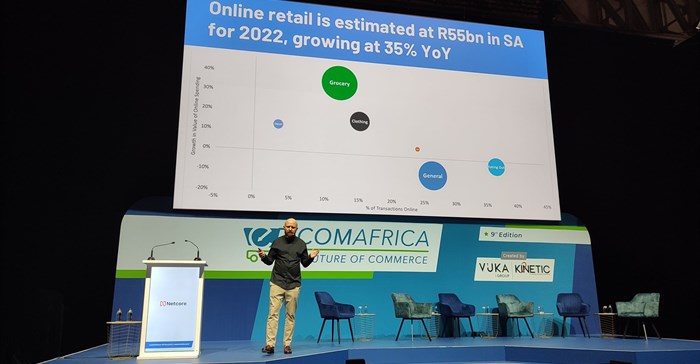The world of e-commerce has experienced a massive surge in growth and innovation, fuelled by advancements in technology and changing consumer habits. With the Covid-19 pandemic accelerating the shift towards online shopping, the e-commerce industry is expected to continue its upward trajectory in the coming years.

Vincent Viviers, omnichannel retail executive at Pick n Pay, at Ecom Africa. Source: Lauren Hartzenberg
According to Vincent Viviers, omnichannel retail executive at Pick n Pay, innovation in machine learning, payments, loyalty and social commerce are shaping the evolution of online retail.
Viviers co-founded the on-demand drinks ordering app Bottles in 2016, which integrated with Pick n Pay and was later acquired by the supermarket giant and rebranded to Pick n Pay Asap, building capacity for Pick n Pay to compete in the on-demand grocery delivery space.
Viviers took to the main stage at the Ecom Africa conference and expo held in Cape Town this week to share his top five emerging e-commerce trends that businesses need to know.
1. Retail media revolution
Referring to it as the “third wave of digital advertising”, Viviers noted that retail media accounted for 20% of all digital advertising spend in the US for 2022, and the biggest part of retail media globally is sponsored product ads in search. Retailers like Amazon and Walmart are stealing market share from Google and Bing with sponsored product ads, which now make up 65% of all searches in the US.
“Google knows what your intent is from the title of your searches. Social media knows what you engage with because that's where we spend a lot of our time. But we as a retailer, we know what you buy, and that creates extremely powerful signals for us to serve more targeted and relevant ads,” he said.
This targeted advertising can occur in-store, on retailers’ apps and websites, or through channels within their network anywhere on the internet. Viviers used the example of a consumer buying kitten food, which creates a signal that can be shared with an insurance company to target new pet owners.
2. Social and chat commerce
With consumers spending an immense amount of time on social media and chat platforms, integrating e-commerce seamlessly into those experiences can be an effective way to increase sales. Viviers noted that in 2022, people globally spent over 9 trillion minutes on Netflix, a statistic that is dwarfed by the amount of time we spent on TikTok in 2021 - an eye-watering 22 trillion minutes.
Users are already able to buy products directly through social apps such as Instagram and TikTok, and retailers like Amazon have adapted to this trend with the launch of Amazon Inspire, a TikTok-like feed of images and videos that align with the way customers want to shop.
Closer to home, Viviers illustrated the potential of WhatsApp, which boasts over 90% penetration in the three key sub-Saharan African markets - Kenya, South Africa and Nigeria.
WhatsApp's commerce platform is already powering thousands of small businesses in South Africa, providing a simple way for customers to order and pay for goods. Larger businesses are starting to adopt this strategy too, Viviers said.
The real opportunity, according to Viviers, lies in driving e-commerce penetration at scale in emerging markets, where entry-level smartphones and limited storage space make it challenging for customers to download multiple apps. However, with WhatsApp's widespread usage in these markets, it could be a potential channel for retailers to reach a large portion of customers.
3. Artificial intelligence
Artificial intelligence (AI) is a paradigm shift and it's going to revolutionise the way we do business and e-commerce, Viviers exclaimed.
“This is probably bigger than the invention of the internet itself. We’re creating a brand new species that’s smarter than all of us. That often leads to people going ‘this is threatening my job and my livelihood’, and what I want to tell you is that AI will not steal your job (at least not for now), but a person who is comfortable using AI will.”
AI's ability to synthesise large amounts of data at a rapid rate is something humans cannot match, and businesses need to leverage this technology to stay competitive. Sharing an example of how AI is being used at Pick n Pay, Viviers said that in a matter of seconds, ChatGPT generated trends in customer feedback using hundreds of thousands of rows of raw data. “It could influence our product roadmap immediately.”
Uber took 70 months to reach 100 million active users, Instagram took 30 and TikTok took nine, but ChatGPT has taken just two months. AI is set to continue evolving and being adopted at a rapid rate, and Viviers cautioned everyone to not get left behind in the AI revolution.
“If you are not already reading about AI, testing the different tools and staying abreast with the developments, you're going to be left behind in a matter of months,” he warned.
4. Integrate loyalty and value-added services (Vas)
Viviers said that while loyalty programmes have long assisted retailers to grow customer databases and garner the loyalty of shoppers, they have become more gamified by encouraging customers to complete certain actions to unlock rewards.
But loyalty programmes are evolving beyond that. Globally there's a shift from free schemes to programmes that are more akin to paid-for subscription services, as seen with Amazon Prime, Walmart Plus and Apple Plus, which all entice customers with a unique set of exclusive rewards.
“When you link that with value-added services, what you can unlock in terms of customer adoption is huge. And there's no better example of this than Discovery Bank and Vitality locally,” Viviers said.
Within the 11 months following Discovery Bank’s introduction of flight bookings to its Vitality platform, allowing customers to easily view discounted flights and access their Vitality discounts, Discovery booked more than 450,000 flights totalling a value of over R1.1bn.
“This shows you the true power of bringing a digital loyalty programme and financial services together in an app,” he said.
5. Buy now pay later 2.0
The buy now pay later (BNPL) payment method has seen a steady uptake in online retail, and is only getting more attractive as cash-strapped consumers grapple with the rising cost of living.
However, the tedious sign-up process of some BNPL platforms has resulted in an undesirable break in the customer's e-commerce journey and a barrier to BNPL adoption. Luckily, new developments are resulting in the onboarding and checkout processes becoming far simpler and more user-friendly.
Viviers referenced Apple Pay Later, which launched last month, and South African company Float, as two services simplifying BNPL for shoppers. The latter uses a customer’s existing credit card to spread out payments over a period of up to 12 months interest-free.
“If we can cut out the tedious signup process of BNPL platforms, and make them as simple as paying with a card, they’re going to continue to grow for every category, not just for big-ticket items. In global markets, we’re seeing people using BNPL for groceries as well as home purchases,” Viviers said.






































